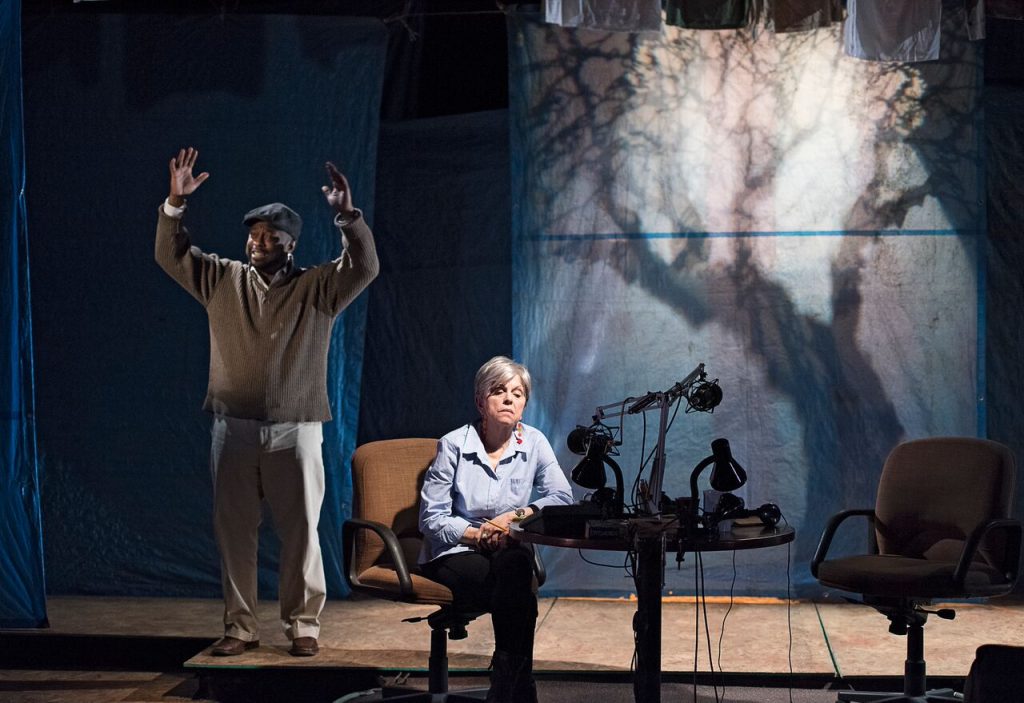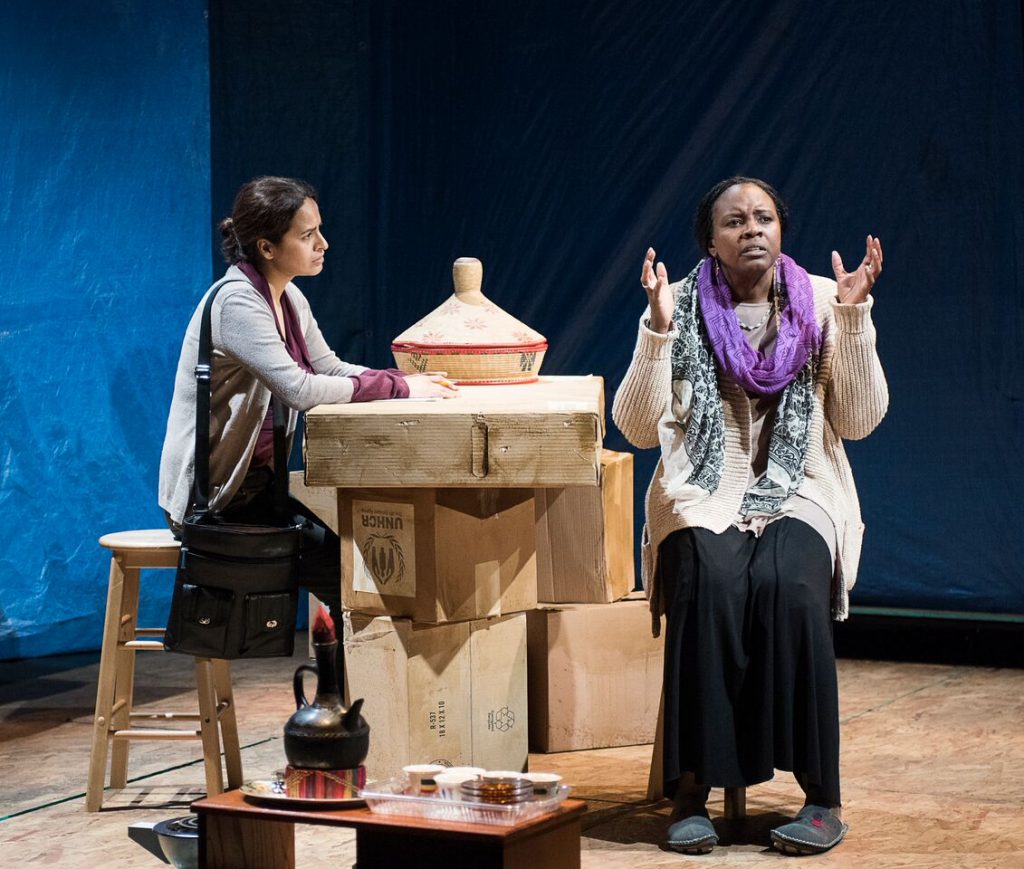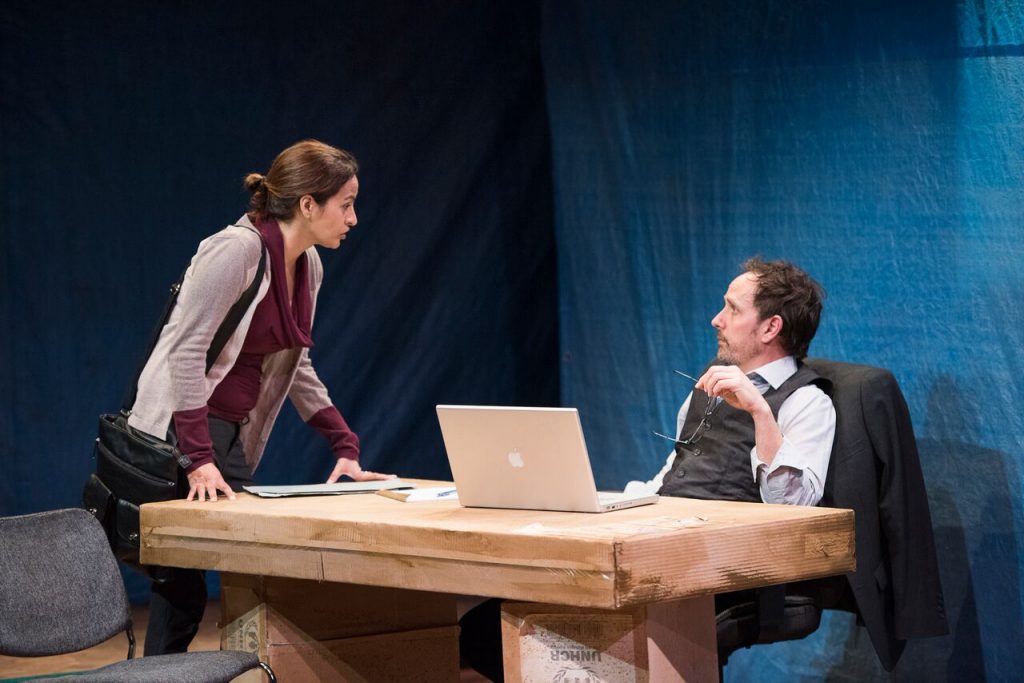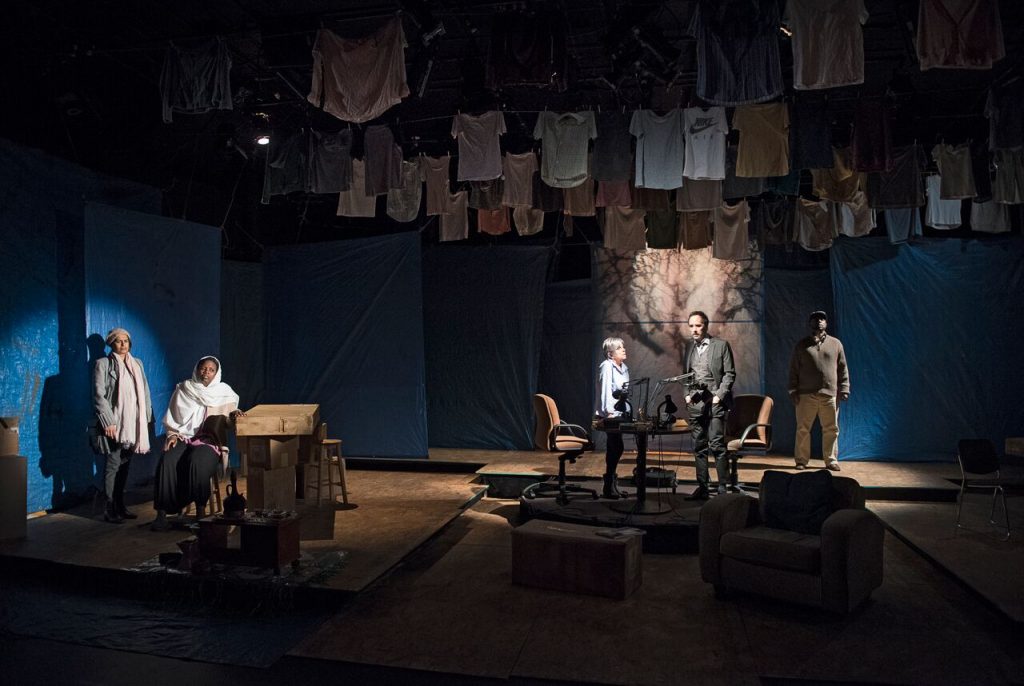
Credit: Emily Cooper
Firehall Arts Centre until April 1, 2017
604-689-0926/firehallartscentre.ca
Posted March 24, 2017
Refuge is so timely it’s frightening. Appalled Canadians looked on as President Trump banned entry into the US from seven, mostly-Muslim countries. In Canada – this tolerant, melting pot of a country – we heard roars of approval from many Americans south of the border. But we cannot afford to be smug; we are not immune from suspicion and paranoia.
What crossed our minds when we heard the assailant in the recent London so-called ‘terrorist’ attack was named Khalid Masood? Within hours, however, we learned that Masood was born Adrian Russell Elms, to a single, seventeen year old mother in 1965 in Kent. Later, he took Ajao, his stepfather’s name, and in 2009 he converted to Islam and became known as Khalid Masood. Not a refugee, not an immigrant. Homegrown.
Paranoia leads us into dark places and this is at the core of Mary Vingoe’s play, Refuge.

Credit: Emily Cooper
Based on a CBC radio documentary by Mary Lynk, Refuge tells the story of Ayinom Zerisenai, an Eritrean army deserter who seeks asylum and a new start in Canada. His mother Amleset Zerisenai (Angela Moore) landed in Nova Scotia six years ago and already has refugee status and so, it seems, things should go easily for Ayinom who has braved the perilous Mediterranean crossing where thousands have drowned in their frantic efforts to escape war-torn Africa. (Set and light designer Lauchlin Johnston hangs dozens and dozens of short-sleeved cotton shirts on clothes pegs high over the performance area – blue-lit, ghostly symbols of those who died in the crossing and of the laundry hanging in refugee camps where so many asylum-seekers spend weary, half-starved years.)
But questions arise amongst the other characters in the play about Ayinom’s past: did he torture men, women and children? Why did he volunteer? Does he pose a threat?

Credit: Emily Cooper
English language teacher Pamela (Sangeeta Wylie), learning about Ayinom’s troubles from his mother, persuades immigration lawyer Saul Ackman (Robert Moloney) to take Ayinom’s case. Freed from detention but awaiting his hearing, Ayinom moves into a spare room in Pamela’s house but her husband Allan (Frank Zotter), jealous of the time his wife is spending with Saul, raises doubts. What do they really know about Ayinom who now sleeps in the room next to the couple’s sleeping eleven-year-old daughter, he asks. In a loud, angry scene Allan and Saul go toe-to-toe: suspicion versus compassion.
Refuge proceeds through a series of radio interviews conducted by a character simply called Interviewer (Nicola Lipman). The interviewer is not named and clearly stands for all of us who need answers. Through interviews with Pamela, Saul and Ayinom’s friend Mebrahtu (Aadin Church), the interviewer wearily reminds each of them to answer in full sentences and to speak clearly into the microphone. We get the feeling she has done this a thousand times before and is, more or less, unaffected. She’s doing her job.
Tellingly, we never see Ayinom and references made to him are in the past tense.

Credit: Emily Cooper
Directing this Firehall Arts Centre production is Donna Spencer who brings together a skillful, sensitive cast. Saul holds the moral high ground and Moloney exudes tolerance and integrity in contrast to Zotter whose Allan is a mess of insecurity and jealousy. As the grieving mother Amleset, Moore is quietly but heart-wrenchingly devastated. Wylie, whose character wants to believe the best, is nicely grounded and she holds her own between Moloney and Zotter, the two stronger characters who represent polar opposites in the situation.
At the heart of Refuge is Mebrahtu who describes his friend Ayinom as a “gentle man” and a “good man” “He helped farmers”, Mebrahtu tells the interviewer, and he tried to leave the military three times before he succeeded. Church’s soft, musical voice is, at first, a little hard to understand, but soon we catch on. His performance in the broadcast studio is charming and sweet and his portrayal of Mebrahtu’s grief – at the end of the play – is a heartbreaker.
Timely, disturbing and powerful, Refuge is a window on the refugee process in this country and the horrifying alternatives facing unsuccessful claimants who are doomed by the Immigrant and Refugee Board to be returned to their homeland.

